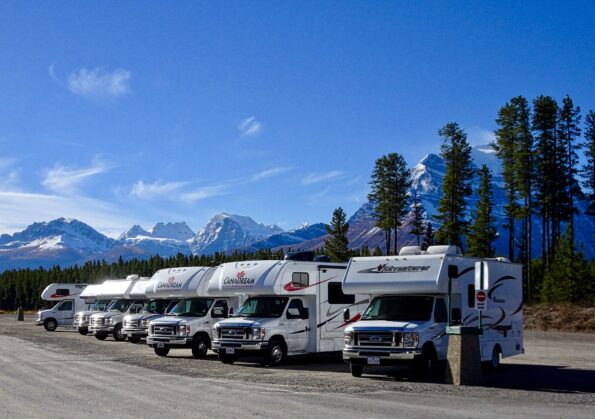Recreational Vehicles, also known as RV’s, can be a great luxury. But they’re a luxury that you pay a pretty penny for. Very few people buy an RV outright. Instead, most people select some type of RV financing.
Today we’ll review RV financing in Canada, how it works, and what you need to obtain it. So let’s get started.
What is RV Financing?
RVs can be expensive. Even a used RV can cost upwards of $10 000. The average cost for an RV is anywhere between $15 000 to $40 000, but a high-end RV can cost upwards of $100 000. For this reason, most people seek out financing to help them pay for their purchases.
When you use financing, the financier pays for your RV, and you pay them back monthly over a specified period of time. This makes it more financially affordable for people on a modest budget to enjoy the luxuries that come along with owning an RV.
There are many different places you can go for RV financing, including the dealership itself, banks, credit unions, or even online lenders. The monthly payment amount will depend on the contract you have with the lender, how much you owe, and how long your financing period will be.
How do RV Loans Work?
RV loans work just like any other type of loan. Once you decide where you would like to obtain the loan, you can file an application. Most lenders will check your credit score before approving your loan, although some lenders are more generous with credit checks than others.
If approved, you can then decide on the terms of financing together. The terms of financing will outline the loan conditions, including the borrowed amount, the interest amount, and the financing term.
You will then pay this borrowed amount plus interest back overly monthly payments for your agreed-upon term length.
What is a Conditional Sales Contract?
If you finance your RV directly through the dealer, there’s a very high likelihood that the loan will be written on a Conditional Sales Contract Agreement.
In short, this means that you don’t need any security against the loan except for the RV itself. In other words, if you don’t make your payments, the dealer has the right to repossess the RV at any time.
Suppose you don’t acquire your loan through the dealership and decide to use a bank, credit union, or some other option. In that case, they may require an additional security deposit for your loans, such as another vehicle or your home.
For this reason, many people do prefer to go straight to the dealer when acquiring a loan for their RV.
What does a Typical RV Term look like?
Many people also prefer to use a dealership to finance their RV loans because their monthly payments are typically lower than that of bank rates. Because RV’s are often much more expensive than trucks, cars, or other vehicles, loans are generally offered for more extended periods of time.
A typical RV loan lasts for about five years, but some can last upwards of 20 years depending on the agreed-upon terms with the lender.
Of course, even if you have a 20-year loan, that doesn’t mean you want to take 20 years to pay it off. Your financial situation may change, you may decide to sell your trailer – there are lots of things that can change over the course of 20 years.
The good news is, with a Conditional Sales Contract, you aren’t locked to 20 years. Instead, you can make extra payments or pay lump sums anytime you like, without penalty.
So if you choose to pay the minimum, that’s okay, but if you would like to pay the trailer off sooner than expected, that’s okay too.
What are Dealership Fees?
If you do decide to obtain your loan from a dealership, it’s important to note that you may be charged “dealership fees.” These may be discussed as “administration fees” or “financing fees.”
These fees generally range anywhere between $300 to $1200, though you may be able to talk the dealership down if you’re good at bargaining.
These fees are designed to help “pay for administrative services,” but they are just extra profit for the dealership in simpler terms. Some dealerships do not charge these extra fees, though most do.
Be sure to ask precisely what the dealership fees are going towards to ensure that you aren’t just getting scammed.
What is the Average Interest Rate of RVs in Canada?
RV interest can range anywhere from 0% to over 50%. With that being said, the average rate at a traditional bank in Canada is between 4-12% for terms of 12 months to 10 years.
Online lenders generally range between 0-30% interest and personal loans between 20-47%. Unfortunately, there isn’t much information out there regarding the average interest rate when applying through a dealership.
Still, it is safe to say that dealerships generally charge less interest than traditional banks, so in most cases, you will be looking at interest rates below 12%.
Of course, many different things can impact your interest rate. The total amount of your loan, the amount you place for a downpayment, and your credit score will all impact your rate.
As a general rule of thumb, the worse your credit score, the higher your interest rate will be. If you’re looking to buy a larger, more expensive RV, it’s worth trying to improve your credit score first to save on interest rates.
What do you need to qualify for an RV loan in Canada?
Qualifications to qualify for a loan in Canada will differ depending on where you obtain the loan from. All lender types will require you to have an ID and an address here in Canada.
Most lenders will also require you to have proof of employment, as well as good credit. With that being said, some credit agencies and lenders will still accept low credit but without a doubt, your interest rates will be high.
If credit is a concern of yours, take your time to build it up before purchasing your RV. You can also shop around until you find a lender that provides you with a reasonable rate.
Insurance for RV’s
In addition to all of the above, most lenders will also require you to have proof of insurance to qualify for an RV loan.
Different lenders require different specifications to be met in terms of insurance, so it’s important that you understand your lender’s terms before purchasing an insurance policy.
When acquiring insurance, make sure that the policy outlines everything the lender requires, or you could end up being turned down for your loan.
Can I use a Co-Signer for my loan?
In some cases, yes. While not true for all lenders, some will allow you to use a co-signer if you do not have good credit. Having said that, it’s important to remember that whoever co-signs your loan will become responsible for the payments if you fail to make them on your own.
In conclusion, buying an RV is not cheap. For this reason, many people prefer to obtain a loan as opposed to purchasing it outright. In such a case, there are many different options including banks, credit unions, and personal lenders.
Having said that, going through the dealership is often the best option because they generally charge less insurance than other lenders. Don’t be afraid to shop around until you find a deal that fits you.












